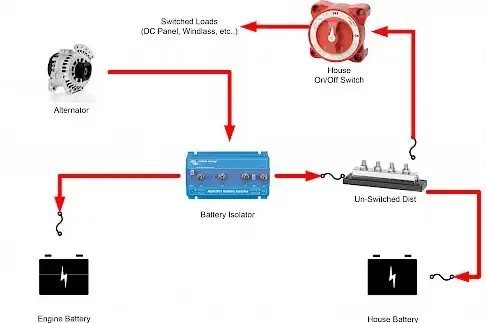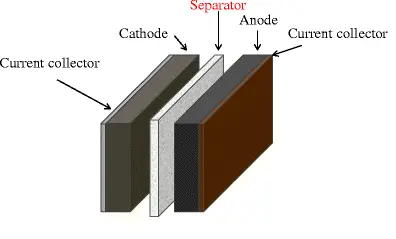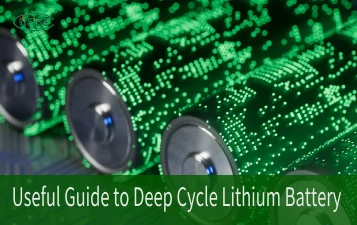Battery isolation and separation are crucial when managing electrical systems in vehicles and marine applications. Both battery isolators and battery separators are devices designed to control the flow of electrical current between multiple batteries. While they serve similar purposes, there are distinct differences between the two. This article will explore the functions, constructions, and applications of battery isolators and battery separators and compare their key features to understand their disparities.
Part 1. What is a battery isolator?

A battery isolator helps manage many batteries in a vehicle or system. It ensures each battery charges and discharges alone, stopping one battery from taking power from another.
Function:
A battery isolator lets power flow from the alternator to the batteries in one direction. It stops power from going between the batteries. Battery isolators control power flow between batteries to ensure each battery gets the right charging power so they don’t get too much or too little.
Construction:
Companies usually make battery isolators using diodes, relays, or solid-state tech. Diode-based isolators use special diodes to control power flow, letting it only go in one direction. Relay-based isolators use electromechanical relays to isolate batteries based on voltage. Solid-state isolators use special semiconductor devices to isolate batteries, offering more efficiency and reliability than diode-based ones.
Applications:
Battery isolators are used in different vehicles and systems with many batteries, like:
- Automotive vehicles: Battery isolators are often used in trucks, RVs, and boats to handle different batteries for starting, accessories, and extra systems.
- Marine and boating: In boats, battery isolators are necessary to keep battery banks separate for starting the engine, navigation tools, and onboard electronics.
- Solar power systems: Battery isolators help manage charging and discharging in solar power systems that aren’t connected to the grid, ensuring energy is used well.
- Emergency vehicles: Fire trucks, ambulances, and other emergency vehicles use battery isolators to power essential equipment without draining the main battery, keeping them working during emergencies.
Part 2. What is a battery separator?

A battery separator stops electricity from going between nearby batteries’ positive and negative parts but still lets electricity flow. This helps prevent short circuits and keeps batteries safe and working well.
Function:
A battery separator’s main job is to separate each battery’s electricity in a system. It makes a barrier between nearby batteries’ positive and negative parts. This stops them from touching directly but lets electricity go through to power things. Ensuring each battery works independently without being affected by nearby ones is essential for good performance.
Construction:
Companies use plastic, rubber, or glass to make battery separators that stop electricity. They shape these materials to fit between nearby batteries’ parts. Some separators have paths for electricity to go through while keeping batteries apart. They might also have safety features like fuses or protection from too much electricity to keep batteries and connected things safe.
Applications:
Battery separators are widely used in different situations where there are many batteries, such as:
- Automotive vehicles: Battery separators are vital parts of vehicles with two batteries, like trucks, RVs, and off-road vehicles. They stop accidents by preventing electricity from taking the wrong path and ensuring power goes where it’s needed in the car.
- Marine and boating: Battery separators separate each battery’s electricity to keep the boat’s electrical system safe and prevent harm to sensitive equipment.
- Renewable energy systems: Battery separators are crucial in solar and wind power setups that aren’t connected to the regular power grid. They ensure batteries charge and discharge correctly to store as much energy as possible.
- Industrial equipment: Battery separators are used in different industries, like backup power systems, communication gear, and machines that move things around. They ensure these machines run safely and smoothly, even in harsh conditions.
Part 3. Battery isolator vs. separator comparison
Function:
- Battery Isolator: The primary function of a battery isolator is to manage the charging and discharging of multiple batteries in a vehicle or system. It ensures each battery receives the appropriate charging voltage without draining power from other batteries.
- Battery Separator: A separator prevents electrical contact between adjacent batteries’ positive and negative terminals while allowing electrical current to flow. It helps avoid short circuits and battery damage by maintaining isolation between them.
Construction:
- Battery Isolator: Manufacturers use diodes, relays, or solid-state technology to construct isolators. They control the current flow, allowing it to pass in one direction only and ensuring each battery operates independently.
- Battery Separator: Separators are made of plastic, rubber, or glass, providing electrical insulation between battery terminals. They may include built-in conductive pathways to allow current flow while maintaining isolation between batteries.
Voltage Drop:
- Battery Isolator: Isolators may introduce a small voltage drop across the diodes or relays, which can affect charging efficiency slightly.
- Battery Separator: Separators generally do not introduce significant voltage drops since they rely on insulation rather than electronic components.
Applications:
- Battery Isolator: Users employ battery isolators in vehicles like trucks, RVs, and boats with dual battery systems to manage power distribution and prevent overcharging.
- Battery Separator: Found in various applications where multiple batteries are employed, including automotive, marine, renewable energy systems, and industrial equipment.
Cost:
- Battery Isolator: Isolators may be slightly more expensive due to the electronic components used in their construction.
- Battery Separator: Separators are often more cost-effective since they rely on more straightforward materials for insulation.
Installation Complexity:
- Battery Isolator: Installing an isolator may require some electrical knowledge and wiring expertise, especially for systems with diode or relay-based isolators.
- Battery Separator: Separators are relatively easy to install since they typically involve placing a physical barrier between battery terminals.
Maintenance:
- Battery isolators: Depending on the type and complexity, battery isolators may require periodic maintenance to ensure proper functioning, such as checking for voltage drops or replacing worn-out components.
- Battery separators: Generally maintenance-free, battery separators only need an occasional inspection for damage or deterioration of insulating materials.
Part 4. Conclusion
Battery isolators and separators play vital roles in managing electrical systems. Understanding their differences helps select the right solution for specific applications, ensuring optimal performance and safety.
Related Tags:
More Articles

Overview of Deep Cycle Lithium Battery
In this article, we explore the life, voltage, capacity, and charging considerations of deep cycle lithium batteries.
How Long do Lithium Batteries Last?
How long do lithium batteries last? we will explore the factors that influence the lifespan of lithium batteries and provide insights into their longevity.
How to Choose the Best LiFePO4 Battery?
Choose LiFePO4 batteries for superior performance, safety, and versatility in EVs, UPS, and backup power. This guide helps you make informed decisions.
Get 12v Lithium Car Battery As a Power Source for the Ride
Make the right choice for your vehicle's battery needs by installing a 12 volt lithium car battery. You will enjoy maintenance-free longevity with this change.
Everything About A Small Lithium Ion Battery
Discover the features, uses & future potential of a small lithium ion battery. A compact and tiny powerhouse ideal for smartphones, wearables, drones & more.



